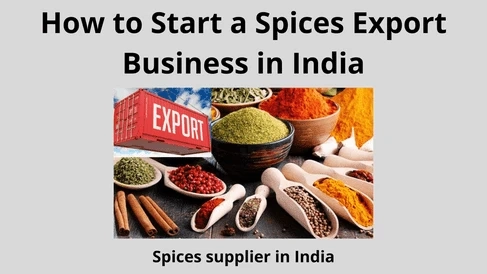Indian spices are known for their authentic taste and flavors. India is attributed as the largest producer and second largest exporter of spices. Distinctive spices are found across the country. Indian climate is highly suitable for spices cultivation. Tropical and subtropical climatic patterns are found in India. Spices are not only known for adding flavors and colors to food. Their richness enhances by the presence of medical properties. Which treats severe diseases like cancer and severe digestion. The increasing population growth is leading to an increasing consumption rate across the country. This driver is leading to creating an opportunity for the Spices supplier in India to scale up their business exponentially.
Domestically and internationally in both, the markets Indian spices are popular. This is due to their authentic nature. Thus, internationally, their demand is increasing, leading to an increase in Indian spices export practices. Varieties of Indian spices are available across the country that one can deal in, which include, fennel seeds, coriander, mustard, turmeric, poppy seeds, cumin, and coriander.
Different types of spice exports business in India
Manufacturers, merchants, wholesaler traders, and suppliers of spices. These are the types of spices export business in India.
These are the Indian spices businesses one can easily indulge in. manufacturers refer to the primary producers of the spices at a large volume scale. Whereas, merchants and traders act as the middleman supplying spices to the relevant retailers. And they ensure the reaching of the products to retailers for serving the main purpose, distributing, packaging, and selling of the products. Where third-party manufacturers work with the production of spices and suppliers who supply to foreign countries.
The main documents and formalities required to proceed with the export business of spices.
The major first step to set forward is to, register yourself under an MCA as a firm, a private limited business, and a proprietorship.
The next step is to obtain an IEC which is an import and export code, issued by DGFT (directorate general of foreign trade. IEC is a ten-digit number, which is required and compulsory to proceed to import and export business.
After that, if you have planned to start a spice business, then obtaining a registration certificate would be compulsory. Being a spices exporter business owner, you have to register and obtain a certificate registration as an exporter of spices. This certificate would be registered by an Indian species board. To obtain all the essential documents you suppose to apply these online. Apart from this, ISO, IEC, and FSSAI registration.
Now, let\'s jump to the main steps to starting a spices export business.
To commence, entrepreneurs need to decide the kind of business and the types of spices they are interested to deal in. following are the business you can opt for, producers, wholesalers, suppliers, retailers, and exporters. These are the options that one could choose as per their interest and the capital they have.
Subsequently, deciding the spices you would deal with, the next step is market research about the particular spices. In the countries in which you would sell.
Then meet with the prospective suppliers, to proceed to the bulk purchasing. Subsequently, to accommodate the spices, you need to require a suitable storage location.
Hence, you need to install the equipment and machinery to proceed with the export practices. You require the following machinery to run an adequate export practice and process. Compressor, Disintegrator, Heat-sealing machine, Packaging machine, Roster, Spice grinders, sieves, and, Weighing scale.
Once, you are done with the entire formalities and process, now you can supply to the respective countries. Where the products are high in demand.
Challenges that you might face while performing export practices are market risk, packaging leakage, and labor issues. So in a hassle-free manner, you can start your business, and this enables you to earn a handsome profit. As in India, Varieties of spices are available in the country, like, as Star Anise Spice, pepper, mint, turmeric, ginger, cumin, tamarind, oregano, curry leaf, and chili. Highly demanded in both markets due to their authentic colors and flavors.
How the spices board of India promotes the spices exporting practices.
Spices boards of India are established by the ministry of commerce and industry. Contributing in the direction of robust Indian spices export practices. Apart from this, it regulates the spices\' quality.



